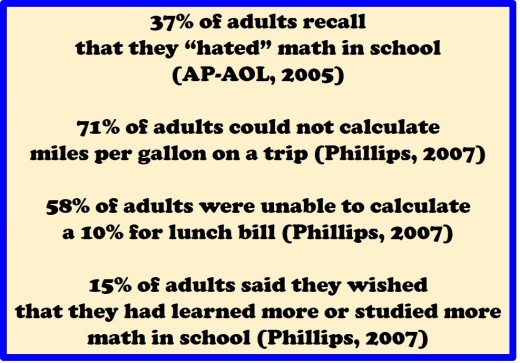Raising Children to Love Math and Have It as Their Favorite and Top Priority to Study and Learn: Homeschooling Tips
Learning Math is Fun

Love it and You will Have all the Pleasure to Learn it
Anything that you will love, you will not see what is difficult about it. On the contrary, anything you will hate will be a big burden on your back as if you are carrying the weight of the entire world even if in fact, it is something that is significant and highly beneficial in life.
Loving Math is like embracing a pet and loving it. You will enjoy every moment spent with this pet and you will not treat it as an additional burden on you. Hating math: learning it would be a pain and no matter how excellent your mentor is, the concepts to learn will be akin to water you wanted to pour into a bottle or container with a lid tightly in place.
Before Going Further, Let us Greet You: Happy Pi Day
Interesting Figures to Consider

Math Attitude Survey
Do you hate Math when you were in grade school and/or high school
Overcoming the Obstacles in Learning Math Concepts
Since homeschooling offers ample time for fun while learning, we were able to start with our math lessons with the right attitude toward it. Factually speaking, the greatest factor why learners have difficulty in grasping math concepts is their hesitance to learn it which is brought about by their attitude to it as I previously emphasized in this article. Math usually elicits a negative response: "it is difficult" or "I am not a Math person." Labeling yourself as someone who is not a math person will draw you away from it then it will become a self actualization scenario.
Once a learner have an initial negative attitude, even before a concept is presented, their is already a wall, impenetrable and hard to crash, between the learner and the learning material.
Below are Five Tips on how to Encourage boys and girls to form a positive attitude toward Math.
Introduce Math with Something your Child Loves
Most of our tendencies and preferences have roots on our experiences in the first six years of our life, according to many child psychologists. As parents, we are the first teachers of our children. We taught them how to differentiate colors and sizes; how to identify the alphabets and how to count. In short, we are their very first Math teacher. In addition to this, we are the very person in the world who knows what our child likes and does not like. Of course, at the stage that they are under six, they are fond of toys. This is where parents' creativity come into play - does the child love super heroes? Collect some and do fun activities with it.
I remember when my eldest son was five years old. He liked cars and super heroes like any other child of his age. In addition to this, he knows how to count coins (money) ; calculate simple addition and subtraction as he is always monitoring how how many coins are in his coin bank and how far he is from being able to buy the next toy in his mind. This shows that young children will voluntarily find their way to learn and grasp concepts that are useful for them. It goes without saying that if anyone realizes how useful math is in our daily life, he or she will surely find his or her way to learn and grasp it. Positive feeling elicited equals positive attitude produced. This cannot be over emphasized. With my lengthy discussion above, by now, we would have agreed that the very first step is finding an approach to reach the goal of molding the child to love math.
Choosing the Right Toys
While I agree that we, parents should allow our kids decide on what toys to pick to encourage them in making their own decisions even at this early stage in life, it cannot be discounted that children are keen at observing what their parents would tend to choose if they are the ones to pick. It is also a fact that kids would usually get the confirmation from their parents when they pick their toys. This chance of injecting what we think is best for them must be taken advantaged of in a wiser way. Wise parents will not outrightly say no to toys that are, in their opinion, not helpful to the mental and psychological development of their child. Instead, they will start by acknowledging something positive about the toy. With this, the child will not feel intimidated and rejected. Moreover, he will open his ears to hear more of what the parent has to say. Upon reaching this stage, the smart parent will then proceed to recommend one that is educational and useful for the child. Note that I used the word recommend. If we choose words that are too suggestive, the child would likely insist on his initial choice.
Of course, we all know that puzzles, legos, building blocks, construction toys, connect four, board games and cards are among the best educational toys for math.
Brainy Toys on Amazon

Math is Life: A Realization that a Child Perceives when He Sees that Math is Applied in Daily Life
We want to cook or bake - it involves math. We want to buy some stuff from the grocery - it inevitably involves math. Many aspects of our life involves math; even some routine and daily activities we do involves math. There is no need to say this literally to a child under six. Many children at this age grasp concepts by making conclusions in their mind of what is the meaning and implications of things. They assimilate and learn through their kin observation of what is going on around them. Thus, if we engage our child in baking or cooking and we talk about proportions and measurements, they will learn these concepts faster and more intently than when we start writing on a piece of paper these concept and start lecturing and inputting numerical calculations. Believe me, the child will get bored and he will start hating math.
To highlight my point in this sub topic, we will encourage a child to love math is we will engage him in different daily activities and inject in these activities math concepts.
Focus on Logic not Math Tricks
When a child understands the underlying concept why one half of 10 equals five, he could slowly progress to solving bigger related problems. In the contrary, if the child simply memorized that the answer is five, surely he could not proceed to a more difficult task to handle. I agree that there are certain lessons in math that requires memorizing it - the multiplication table, for example. However, as parents, there is a need to guard against the tendency of the learner to memorize the answer to a question instead of understanding the rationale behind it. Having said this, allow me to point out that Math tricks are useful - it provides a quick way for a child to solve or calculate math problems. Nonetheless, math tricks should not be introduced until the child grasps the logic involved.
Below, I posted an amazing Math trick in multiplying numbers really quick. Again, let me reiterate the caution I had already mentioned: Do not present this to the child until he understands your lesson in multiplication.
Amazing Japanese Math Trick: Multiply Numbers Really Quick
Kids Teaching Kids
When I was in high school, my teacher would usually discuss the lesson once and the next meeting, I will discuss it again to my classmates. She repeatedly commented that perhaps it is easier for her to teach me the lessons and I will take her place in class. It is not because I was smarter than her; it was because as I stand there in front of my classmates, they can connect to what I am trying to say because I am their fellow learner. I speak their tongue and I use their vocabulary. I talk like how we talk as we chat outside of the classroom and the barrier and the walls they built were crashed; their fear and apprehensions vanished.
Below, I added a video from Learn with Prince channel. This child posts videos on learning math concepts. It would be helpful to let your child find a channel that catches their attention, preferably one with their own generation speaking and explaining different mathematical concepts. You will be amazed to note that they will learn faster and even if you said it in the same way as this child did, it seems that your explanation landed on deaf ears while the explanation of this child is well understood.
Learn with Prince: Subtracting Fractions
Have I Written 5 Important Tips in Raising a Child Who will Grow to Love Math?
Ink your comments below and let me know your reaction to what I have written.
Do you have ideas? You are welcome to write them too.
Thanks for reading.








